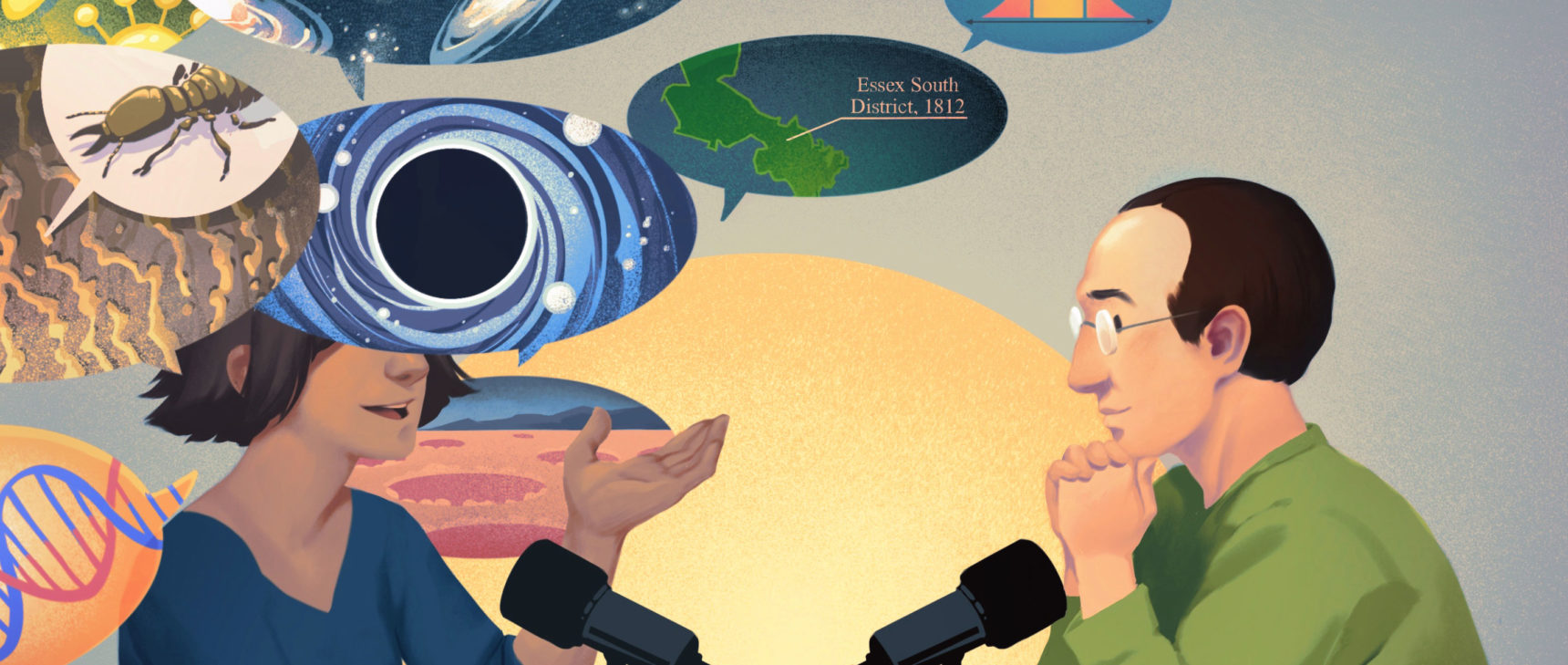Why I’m Hosting The Joy of x Podcast

Ashley Mackenzie for Quanta Magazine
Introduction
As a teenager in the 1970s, I used to love snuggling up in a big, soft velvet chair in my high school library. There, in its burnt-orange upholstery (I told you it was the ’70s), I’d lose myself in the memoirs of great scientists. One of those autobiographies, Werner Heisenberg’s Physics and Beyond: Encounters and Conversations, made an abiding impression on me. In it, he describes feeling hopelessly stuck on a problem as a young postdoctoral fellow. To make matters worse, he was suffering from such a severe case of hay fever that he had to take two weeks off and escape to a remote, pollen-free island in the North Sea. One night, he suddenly saw the solution to his problem. He was far too giddy to sleep, so as a new day dawned, he climbed “a rock jutting out into the sea … and waited for the sun to rise.” His late-night epiphany is now called quantum mechanics.
This is the kind of fascinating thing we can learn by hearing great minds talk about their work and how it connects to their lives. It’s the best way, and maybe the only way, to learn not just what great scientists do but why they do it.
So when the editors at Quanta Magazine invited me to host a podcast for them, I jumped at the chance. But it wasn’t immediately obvious how to create a podcast that could live up to Quanta’s mission of “illuminating basic science and math research through public service journalism.” How could we achieve that in a podcast, keeping in mind the particular strengths and limitations of the medium? (And of the host!)
At first we considered an approach centered on themes common to all of science, such as the quest for truth and the use of evidence, observation and reasoning. We also entertained the idea of a serial format, where we would focus on a single scientific story with twists and turns, building suspense from week to week. But after batting around these and other ideas, in the end I felt myself drawn back to the lure of that cozy velvet chair. I wanted to hear scientists’ stories, to learn their innermost desires, to understand what moves them and fascinates them and what they’re most curious about.
So we decided on a conversational format, in which I’d chat with a wide range of scientists about their lives and work. In my dreams, each conversation would be relaxed yet informative, full of banter and wild ideas. My excitement grew at the thought of what fun this would be and how much I’d get to learn about the many branches of science and math represented by our growing guest list. Being the host meant I could follow my curiosity wherever it led.
But I also hoped the interviews might go beyond the merely intellectual, to reach for soulfulness and intimacy, to reveal something of a scientist’s struggles, dreams and setbacks. Such intimacy would tap into the peculiar power of podcasts to be deeply moving — far more so than television and print interviews. It’s emotionally intense to hear someone’s own story, in their own voice, piped into your ear.
The hope was that the listener would enjoy feeling like a fly on the wall, eavesdropping on two scientists schmoozing. At the risk of sounding immodest, I think we’ve achieved that with our first season.
Through this podcast, I’ve been learning about the inner lives of some of the most intriguing mathematicians and scientists working today. A few are old friends and colleagues, while others are people I’ve still never met in person: Until their voices came through my headset, I knew them only through their research. But in every case, I wanted to know what makes them tick. I wanted to know why they do what they do, what they’ve discovered, and why it matters to them and to the world.
Keeping the tone conversational turned out to be a wise choice. It makes for easier listening (and it turns out I’m lousy at reading from a script). But the best thing about the cozy atmosphere is that it fosters clearer communication. It allows both me and my guests to admit what we don’t know, and in so doing, to learn and be surprised.

Podcast guests include, from left to right, starting with the top row: Alex Kontorovich, Janna Levin, Robbert Dijkgraaf and Leslie Vosshall; middle row: Cori Bargmann, Corina Tarnita, Priyamvada Natarajan and Brian Keating; bottom row: Tadashi Tokieda, Brian Nosek, Moon Duchin, John Urschel and Rebecca Goldin.
(Kontorovich) AMS by Laurie DeWitt from Pure Light Images; (Levin) Sonja Georgevich; (Dijkgraaf) Gabi Porter, Institute for Advanced Study; (Vosshall) Frank Veronsky; (Bargmann) Chandler West/CZI; (Tarnita) Sasha Maslov for Quanta Magazine; (Natarajan) Sasha Maslov for Quanta Magazine; (Keating) Carson Nicely; (Tokieda) Constanza Hevia H. for Quanta Magazine; (Nosek) Dan Addison | UVA Communications; (Duchin) Alonso Nichols/Tufts University; (Urschel) Courtesy John Urschel; (Goldin) Max Hirshfeld for Quanta Magazine
The scientists I spoke with certainly taught me a lot. As you’ll hear in one episode, the astrophysicist Janna Levin schooled me about black holes, but what I found even more delightful was her explanation of why she’s so obsessed with them. When I asked, “What is it about them for you?” she went off on an astonishing riff that left me with my mouth hanging open. And I wasn’t the only one. The whole time, as I stared through the studio window into the control room, my audio engineer, Bert Odom-Reed, was similarly agape.
Another delightful moment, equally unexpected, came in my conversation with the mathematician Alex Kontorovich, when he was telling me what it was like to work with one of the greatest mathematicians of the recent past, Jean Bourgain. Alex described Bourgain as a superstar among superstars, a sort of Michael Jordan of mathematics. Even other Fields medalists looked up to Bourgain as a giant. So what was it like for Alex, as a young postdoc, to work side by side with him? His answer was so humble and natural, it made me laugh. I bet you will too when you listen to episode 2.
One last thing. Maybe you’re wondering why we call this podcast The Joy of x. Aside from the pun that only people of a certain age will get, we feel that this is a show about different kinds of joy — the joy of discovery, the joy of curiosity, and the joy of being a scientist, to name a few. As in algebra, the letter x represents the unknown quantity, the solution we’re seeking. But to us it connotes anything that sparks imagination and curiosity, anything that lies beyond the edge of what’s known. In short, x stands for the scientific quest.
All of us at The Joy of x hope you’ll enjoy the show. The podcast feed is available (or will soon appear) on Apple Podcasts, Spotify, Android, TuneIn, Stitcher, Google Podcasts, or your favorite podcasting app, or you can stream it from Quanta. The first full episode will be posted on January 22nd, but you can subscribe as soon as the feed appears and download a short audio teaser for the conversations to come. And if you’d like to chat with me about it, you can find me on Twitter at @stevenstrogatz. Thanks for listening, subscribing and spreading the word!






